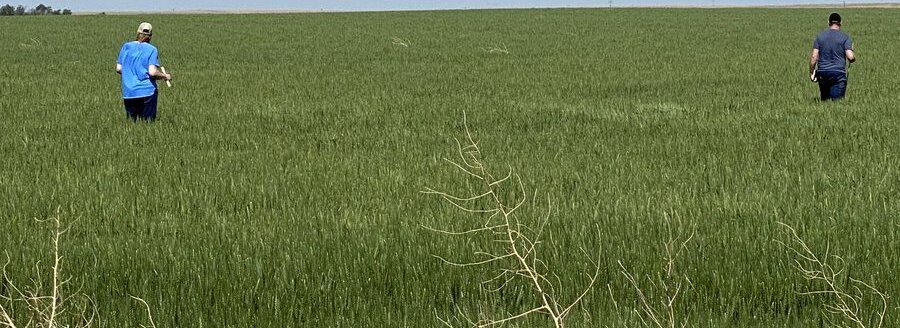Ford County could have some good quality and yields, according to those on May 20, who reported at a recent plot tour.
The Ford County Extension wheat plot, located 5 miles east of Dodge City, Kansas, was planted Oct. 20 and it came at a time when it was dry, said Andrea Burns, Ford County K-State Research and Extension agriculture and natural resources agent.
About five students under the direction of Dave McCollum, a professor of animal science and agriculture business at Dodge City Community College, prepared the 7-acre field for planting tests for 13 varieties.
“It didn’t come up right away,” Burns said. “But we got some timely moisture and it finally came up.”
Like growers she worried about the impact of record cold temperatures for two weeks in February but the plots appeared to hold up.
Lawrence Baxa, an agronomist with Pride Ag, said timing with moisture was important and he liked to see the crop was planted on time. “You don’t have to see it up in the fall,” Baxa said.
Burns said the plot made remarkable progress in recent months.
Baxa said as genetics continue to improve each year, the management level by producers will increase too. “Our wheat is getting better because of genetics and management.”
John Watts, with WinField United, noted his company’s parent owner, Land O’Lakes, has made a commitment to wheat growers as he spoke about the Croplan variety. The days of planting a crop and hoping it turns out has been replaced with management tools that can help growers to obtain not only good yields but also a commodity sought by millers.
Jared Stegman, an agronomist with Crop Quest, Dodge City, noted that farmers will be contending with stripe and leaf rust and southwest Kansas and Oklahoma Panhandle is also experiencing the plant disease.
His advice to growers on diseases is that it is “not too late to spray but to remember it may take up to 30 days for full effectiveness.” They need to consider the weather conditions and when they plan to harvest the crop.
Brooke Zimmer, an agronomist with Crop Quest, said the loss from stripe rust can be so significant spraying a fungicide makes economic sense.
“I don’t see where you would not get your money back,” she said.
This year, growers who decided to apply fungicides should receive a good return on them, Stegman said. It was still too early to see in this region if there any head blight in the crop.
Zimmer said growers need to make sure they are working hard to control volunteer wheat because it is breeding ground for cult mites that cause the vexing wheat streak mosaic virus, which is a devastating threat to the wheat crop.
Those who attended the tour received an update on varieties planted. They included LCS Atomic, LCS Photon AX, LCS Revere, LCS Valiant, LCS Julep, LCS Chrome, WB Grainfield, WB 4699, WB 4792, WB 4401, CP 7869, CP7909 and Longbranch.
The diverse portfolio was designed so growers could how they performed under common growing challenges in western Kansas that include wheat streak mosaic virus, drought, fusarium head-blight tolerance and rusts. There was also WB Grainfield, known for its grazing potential, that Burns termed “an old reliable,” because the West Bred-Bayer Crop Science release dates back to 2012.
Also in the group was LCS Valiant, a 2018 release developed at the University of Nebraska, that was been having good results throughout Kansas.
Sign up for HPJ Insights
Our weekly newsletter delivers the latest news straight to your inbox including breaking news, our exclusive columns and much more.
The Ford County Extension wheat plot tour was planted at the Koch Nitrogen Educational plots, located at the north side of the intersection of U.S. Highway 50 and 116 Road, about 5 miles east of Dodge City.
The plot was a collaboration among Koch Nitrogen, Pride Ag Resources, Dodge City Community College and Ford County K-State Research and Extension.
Dave Bergmeier can be reached at 620-227-1822 or [email protected].




